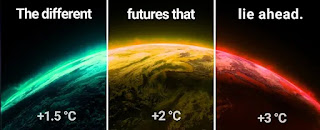Within the next five years, there is a 98% chance that one year will be the hottest on record, and a 66% chance of crossing the critical 1.5°C global warming threshold, according to a concerning report by the World Meteorological Organization. This bleak forecast is driven by the expected El Niño weather pattern and the accelerating global warming trend.
Although the Paris Agreement's long-term warming threshold of 1.5°C above preindustrial levels won't be permanently breached within the next five years, a temporary glimpse into the future consequences of crossing that threshold is highly probable[1]. As greenhouse gas emissions continue to rise, the frequency of setting new heat records will increase, both globally and locally.
The current global temperature record was set in 2016 during a major El Niño event. As El Niño conditions are starting to form again, the likelihood of surpassing that record, particularly in 2024, becomes even greater[2]. This serves as a stark reminder of the urgent need to reduce emissions to net zero and mitigate the human impact on our climate.
Is the Paris Agreement already unsuccessful?
The Paris Agreement, signed by almost all nations globally, aims to limit global warming to well below 2°C, and preferably below 1.5°C, compared to pre-industrial levels. The recent prediction indicating that a single year could surpass the 1.5°C global warming threshold is alarming but does not necessarily signify failure in achieving the agreement's objectives. The goal is to limit long-term global warming to a manageable level, preventing severe climate impacts and ecosystem loss. A couple of years exceeding the 1.5°C mark does not equate to failure.
However, the world is inching closer to the 1.5°C global warming threshold due to persistently high greenhouse gas emissions. This looming probability should serve as a wake-up call.
A stark reminder of humanity's impact on the climate
Past inaction in reducing emissions and addressing climate change has already resulted in over 1.2°C of global warming. With global emissions still near record-high levels, we continue to exacerbate the greenhouse effect and heat our planet.
To keep global warming well below 2°C, immediate action is necessary to prevent future generations from facing a significantly less hospitable Earth.
The solution has been understood for decades: reduce emissions to net-zero to halt global warming. Countries with substantial historical emissions, such as Australia, must play a pivotal role in decarbonizing energy sources and reducing coal, oil, and gas production in accordance with the United Nations' guidelines.
Inaction is not an acceptable option, as it would only guarantee more record-hot years and increasingly severe climate change impacts for generations to come.


Post a Comment